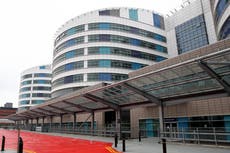NHS summer crisis: London Ambulance Service declares incident as 999 calls surge
Exclusive: Capital’s emergency service hit by wave of 999 calls amid huge demand from the public

London Ambulance Service was forced to declare an incident on Monday after a surge in 999 calls threatened to overwhelm it, The Independent has learned.
Emergency calls increased by a third compared to a normal day, with a sudden wave of more than 400 calls in a single hour during the early afternoon.
Paramedics were told the service was under extreme demand with bosses making the decision shortly before 4pm to declare a “business continuity incident”.
This means there was a risk of normal services being disrupted below an acceptable level, leading to delays in answering 999 calls and a lack of crews to respond to emergencies.
The LAS has been at the highest level of demand, previously known as a “black alert”, since 17 June. Seven out of 10 ambulance services across England are in a similar situation.
In total, LAS received 7,500 emergency calls on Monday, compared with 5,500 on a typically busy day, an increase of 36 per cent.
During the incident category three callers, who are classed as urgent but not life-threatening cases, were advised to seek alternative care via NHS 111 or if necessary make their own way to hospital.
This meant the service could prioritise responding to the most serious calls.
The incident was stood down at 1.30am but the pressure on the system has been ongoing for weeks. The LAS has redeployed clinical staff in non-patient-facing roles back to the front line to help respond to 999 calls.
A London Ambulance Service spokesperson said: “Yesterday we saw high levels of demand for our services and used tested processes to care for our patients – this allowed some people with the least urgent care needs to be treated through alternative routes.
“We continue to prioritise our sickest and most severely injured patients and would like to remind the public that if they need urgent medical advice that does not require an emergency ambulance to go to NHS111 online or to call 111 for advice and support."
In Wales, the Welsh Ambulance Service was also hit by extreme demand and declared its own incident on Monday.
It said it had been receiving 2,000 calls per day via 999 for the last three days, with incidents nine per cent higher than predicted, up 11 per cent on a week ago and 29 per cent higher than on 20 July last year.
Immediately life-threatening calls were also up 30 per cent compared to last week, and 175 per cent up on a year ago.
As a result the WAS said some patients waited many hours for an ambulance. Some were asked to make their own way to hospital.
It said more than fifth of 999 calls were classed as less serious and assessed by NHS 111. This included a person with a fish hook in their foot, a person who had caught their finger in a juicer, and a person with diarrhoea.
The number one reason people called 999 in Wales on Monday was for breathing problems.
Director of operations Lee Brooks said: “It’s very rare that we declare a business continuity incident and it’s not a decision that we take lightly – it’s a sign of a serious situation.
“Yesterday’s heat coupled with the delays at hospitals meant we reached a point in the early evening where demand actually overtook our capacity to respond in a safe and timely way.
“For anyone who had an excessive wait for an ambulance yesterday, we are very sorry for your experience and this is not the service we want to provide.
“While we’re in a more stable position today, we’re still experiencing extreme pressures right across Wales, and we need the public’s help.
“Please only call 999 if a life is on the line – that’s a cardiac arrest, chest pain or breathing difficulties, loss of consciousness, choking or catastrophic bleeding.”
Across the NHS in recent weeks ambulance services have seen record levels of 999 calls, while hospital A&E departments saw their busiest month ever in June.
The chief executive of West Midlands Ambulance Service, Anthony Marsh, has warned the service does not have enough 999 call handlers to meet demand. In Yorkshire, a 999 call was on hold for 12 minutes before being answered.
Join our commenting forum
Join thought-provoking conversations, follow other Independent readers and see their replies
Comments


Bookmark popover
Removed from bookmarks